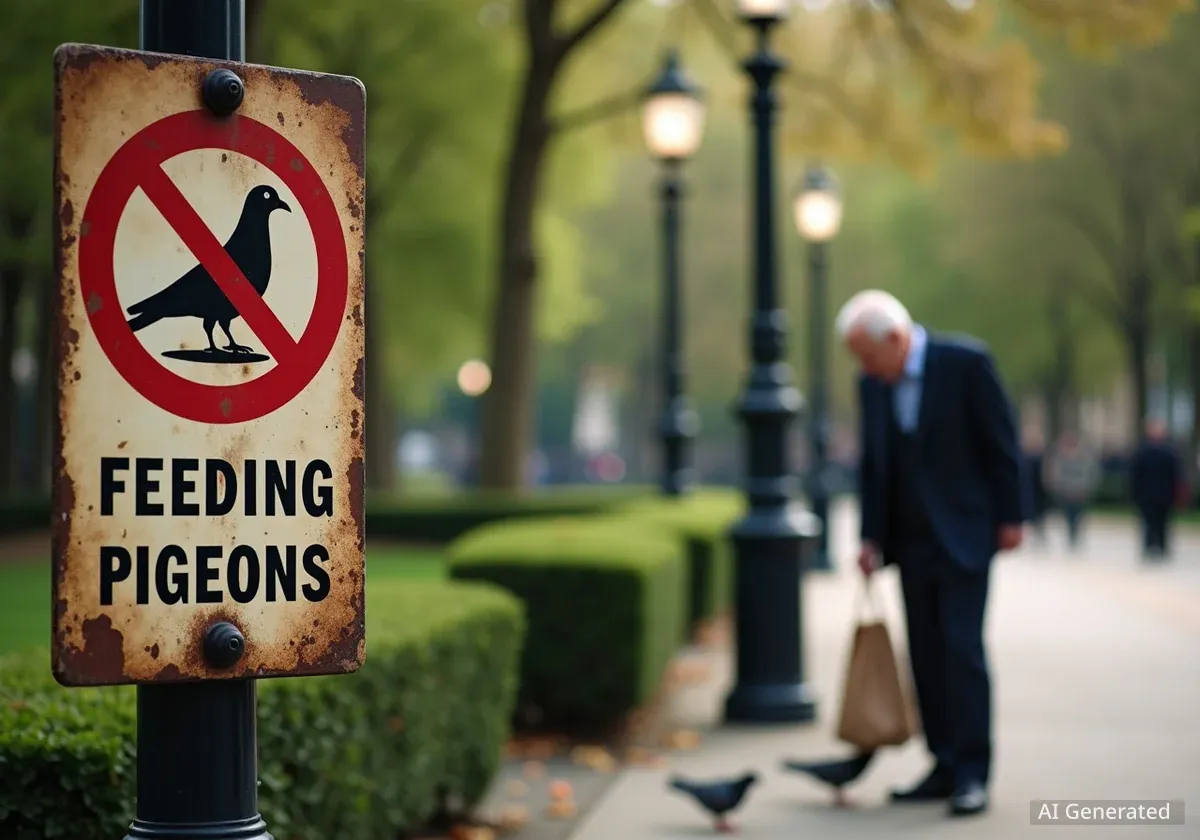A simple act of kindness, like tossing a few crumbs to a pigeon, could land you in court with a potential £1,000 fine in Sefton. This is just one of several surprising local rules, known as Public Space Protection Orders (PSPOs), that residents and visitors might be breaking without even realising it, leading to on-the-spot penalties.
These regulations, designed to curb anti-social behaviour, cover everything from walking your dog to cycling in town centres. But with fines starting at £75 and escalating dramatically, many are unaware of the financial risks associated with these everyday activities.
Key Takeaways
- Sefton Council enforces Public Space Protection Orders (PSPOs) to manage anti-social behaviour in public areas.
- Breaching a PSPO can result in an immediate £75 Fixed Penalty Notice (FPN).
- Failure to pay the FPN can lead to court prosecution and a maximum fine of up to £1,000.
- Specific rules include bans on feeding pigeons in town centres, strict dog control measures, and restrictions on public alcohol consumption.
What Are Sefton's Public Space Protection Orders?
Public Space Protection Orders, or PSPOs, are legal tools used by local authorities across the UK to address specific nuisances or problems in a defined area that are detrimental to the local community's quality of life. In Sefton, these orders grant authorised officers, including police and council staff, the power to enforce a range of rules aimed at keeping public spaces safe and clean.
The enforcement process typically begins with a Fixed Penalty Notice (FPN) of £75, issued on the spot to anyone found breaching the order. While this may seem like a minor penalty, the consequences of non-payment are severe. If an individual fails to pay the £75 notice, they can face prosecution in a Magistrates' Court. If found guilty, the maximum penalty is a fine of £1,000.
The Legal Framework
PSPOs were introduced under the Anti-social Behaviour, Crime and Policing Act 2014. They give councils wide-ranging powers to criminalise behaviour that is not typically considered a criminal offence, such as feeding birds or not carrying dog waste bags. These orders are usually put in place for a period of three years before they must be reviewed.
The Crackdown on Nuisance Birds
Perhaps the most surprising regulation enforced under Sefton's PSPO is the targeted ban on feeding birds in specific urban areas. While feeding ducks at the park remains a cherished pastime, the same cannot be said for feeding gulls and pigeons in Bootle and Southport town centres.
The council implemented this rule to combat issues caused by large flocks of birds, which can include:
- Damage to buildings from droppings.
- Aggressive behaviour towards people, particularly when food is involved.
- Creating an unpleasant and unhygienic environment for shoppers and businesses.
Anyone caught providing food to gulls or pigeons in these designated zones can be handed a £75 FPN. According to the council's enforcement policy, ignoring this fine could ultimately lead to that staggering £1,000 court penalty.
Strict Rules for Dog Owners Go Beyond Scooping Poop
Dog walkers in Sefton must be particularly vigilant, as the PSPOs cover a wide array of responsibilities that extend far beyond the well-known 'scoop the poop' law. The rules are designed to ensure dogs are kept under control and do not cause a nuisance or danger to others.
Key Dog Control Offences:
- Failure to Remove Dog Faeces: Owners must clean up after their dog immediately on all public land.
- Means to Clean Up: An officer can request to see proof that you are carrying a poop bag or other means to clean up. Failing to produce one is an offence in itself.
- Dogs on Leads by Direction: An authorised officer can instruct a dog owner to put their dog on a lead if it is causing a nuisance or is not under control. Ignoring this command is a breach of the PSPO.
- Exclusion Zones: Dogs are completely banned from entering enclosed children's play areas and certain other designated spaces.
- Maximum Number of Dogs: A single person is prohibited from being in control of more than six dogs at once in a public space, a rule aimed at professional dog walkers as well as multi-dog households.
These comprehensive rules mean that a simple walk in the park could become very expensive if owners are not fully aware of their obligations.
Alcohol, Cycling, and Begging: Other Behaviours Under Scrutiny
The PSPOs in Sefton also address several other common forms of anti-social behaviour that impact the enjoyment of public spaces.
Public Alcohol Consumption
While it is not illegal to drink alcohol in most public places, it is an offence to continue drinking when asked to stop by a police officer or other authorised official within a designated PSPO area. Furthermore, you must surrender any alcohol in your possession if requested. Refusing to do either can result in a £75 fine.
Cycling Restrictions
To ensure pedestrian safety, cycling is prohibited in certain designated zones. One of the most prominent examples is Chapel Street in Southport, which is a pedestrianised area. Anyone caught cycling through this or other restricted zones is liable for an FPN. The aim is to prevent collisions and make town centres more welcoming for shoppers and families.
"These orders are in place to ensure that our public spaces can be enjoyed by everyone... We want to make sure Sefton is a safe and pleasant place to live, work and visit." - A statement often cited by councils implementing PSPOs.
Nuisance Begging
The PSPO also targets begging that is deemed aggressive or causes an obstruction. The specific offence is defined as obstructing the public highway or footpath for the purpose of begging. This is intended to address behaviour that makes people feel intimidated or prevents free movement through public areas.
As Sefton continues to enforce these wide-ranging rules, residents are encouraged to familiarise themselves with the local regulations to avoid an unexpected and costly penalty. What may seem like a harmless action could be a clear violation of a local order.





